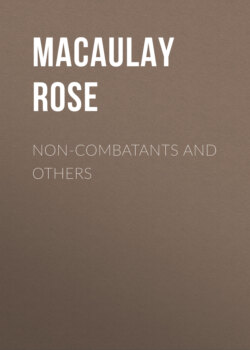Читать книгу Non-combatants and Others - Macaulay Rose - Страница 9
На сайте Литреса книга снята с продажи.
3
ОглавлениеThe dark round eyes of the Belgian girl, looking out through the window, met hers. She laughed and waved her knitting. She took Alix always as a huge joke. Alix had from the first taken care that she should, since the moment when Mademoiselle Verstigel had arrived, fluent with tales from Antwerp. It is a safe axiom that those who play the clown do not get confidences.
The others looked out at her too when Mademoiselle Verstigel waved. They called out 'Hullo, Alix! How late you are. John's been here two hours. Come along.'
Alix limped up the steps and in at the French window, where she stood and blinked, the light on her pale, pointed face and narrowed eyes. John rose to meet her, and she gave him her hand and her crooked smile.
'You're all right now, aren't you?' she said, and John, an accurate person, said, 'Very nearly,' while his mother returned, 'I'm afraid he's a long way from all right yet.'
'Isn't it funny, it makes him stammer,' said Dorothy, who was professionally interested in wounds. 'But he's getting quite nice and fat again.'
'N-not so fat as I was when I got hit,' said John. 'The trenches are the best flesh-producing ground known; high living and plain thinking and no exercise. The only people who are getting thin out there are the stretcher-bearers, who have to carry burdens, the Commander-in-chief, who has to think, the newspaper men, who have to write when there's nothing to say, and the chaplains, who have to chaplain. I met old Lennard of Cats, walking about Armentières in February, and I thought he was the Bishop of Zanzibar, he'd gone so lean. When last I'd seen him he was rolling down King's Parade arm-in-arm with Chesterton, and I couldn't get by. It was an awfully sad change. … By the way, you all look thinner.'
'Well, we're not in the trenches,' said Margot. 'We're leading busy and useful lives, full of war activities. Besides, our food costs us more. But Dorothy and I are fairly hefty still. It's mother who's dwining; and Alix, though she's such a lazy little beggar. Alix is hopeless; she does nothing but draw and paint. She could earn something on the stage as the Special Star Turn, the Girl who isn't doing her bit. She doesn't so much as knit a body-belt or draw the window-curtains against Zepps.'
Alix looked round from the window to stick out the tip of her tongue at Margot.
'Mais elle est boiteuse, la pauvre petite,' put in the Belgian girl, with the literalness that makes this people a little difficile in home life. 'What can she do?'
Alix giggled in her corner. Margot said, 'All right, Mademoiselle, we were only ragging. There's the post.' She went out to fetch it. Margot was a good girl, but, like so many others, tired of Belgians, though this Belgian was a nice one, as strangers in a foreign land go. Alix hated and feared her whole nation; they had been through altogether too much.
Margot came back with the letters.
'Betty and Terry,' she said, with satisfaction. 'Betty's is for me and Terry's for you, mother.' (Terry was in France, Betty driving an ambulance car in Flanders.) 'Two for you, Alix.'
Alix took hers, which were both marked 'On Active Service,' and put them in her pocket. Simultaneously her aunt Eleanor began to read Terry's aloud (it was about flies, and bread and jam, and birds, and some music he had made and was sending home to be kept safe) and Margot began to read extracts from Betty's (about nails, and bad roads, and different kinds of shells, and people) and Uncle Gerald read bits out of the paper (about Hill 60, and Hartmannsweilerkopf, and Sedd el Bahr, and the Leon Gambetta, and liquor, and Mr. Lloyd George).
